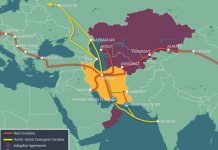At a time when there have been talks of a potential disengagement of Indian and Chinese troops from the highly contested Line of Actual Control (LAC) in Eastern Ladakh, new developments suggest that there might be an onset of tensions in India’s eastern border in Arunachal Pradesh.
F-35 vs F-15: Why Qatari F-15 Eagles ‘Stand No Chance’ Against Israeli / Emirati F-35 Stealth Jets?
Recent reports have suggested that Beijing has officially begun work on a strategically significant railway line in Tibet which will link Sichuan province with Nyingchi, which lies on the Indo-China border in Arunachal Pradesh.
The railway line project is seen to be hugely important for Chinese President Xi Jinping, who gave a go-ahead for its initiation recently while stating – “(The project is) a major step in safeguarding national unity and a significant move in promoting the economic and social development of the western region.”
The railway project, which is the second biggest railway project in Tibet, is highly significant for the Chinese as it will link the Tibet Autonomous Region (TAR) to the hinterland.
Moreover, the railway line will run right up to Nyingchi near the Indian border, with the entire line running from Chengdu to Lhasa, connecting the two capitals of TAR and Sichuan while cutting the journey from 48 hours to 13 hours.

However, having seen blood-spill of the Galwan Valley clash followed by a seven-month-long military stand-off in the Ladakh sector due to China’s expansionist policy, Indian Prime Minister Narendra Modi is wary of his neighboring country’s infrastructure projects.
According to Professor Phunchuk Stodban of the Institute of Defense Studies and Analysis, China’s development of infrastructure is connected to their military motive.
“This means that by creating infrastructure, China can bring missiles to India’s border. Then they do not need nuclear weapons. They can also target through missiles. This pattern of China in places like Kazakhstan, Kyrgyzstan has been that they build railways first and this increases their missile capability. Whereas India and Pakistan talk about nuclear bombs directly. China’s strategy is that it does not talk about nuclear weapons,” said Stodban, while speaking to the BBC.
While the first segment of the railway line from Chengdu to Yaan was completed at the end of 2018, the work on 1,011 km-section from Yaan to Nyingchi, which was officially launched this week, is scheduled to be done in 2030.
Xiong Kunxin, an academic at the Tibet University in Lhasa, while speaking to Global Times, said – “It is also of great significance in safeguarding national unity and consolidating border stability,”
As the railway runs near China’s southwest border areas, it will largely improve the efficiency and convenience of military personnel and material transportation and logical supplies.”
However, according to some experts speaking to BBC, China’s infrastructure is also aimed to divert the Brahmaputra River, which is a major water source for India.
“The Brahmaputra River is a major source of water in India in this area. There have been reports that China wants to divert this water for itself,”
After the completion of this project, the movement of the Chinese army in this area will also increase. Where the Chinese army used to take 36 hours to reach, now it can be reached in 9-10 hours i.e. rapid deployment will be possible. It will also become easier to bring Chinese tanks and missiles to the Indian border immediately.” said an expert.
China has made it apparent that it considers the eastern Indian state of Arunachal Pradesh to be a part of southern Tibet, a claim which India rejects completely.
According to Prof Acharya, a Chinese Studies professor at JNU, India is well aware of China’s infrastructure projects and has set on developing its own infrastructure as a response to that.
“The boundary between the two countries is not fixed and both countries are working on their infrastructure to strengthen themselves. So because of this, tension also increases. India already knows all this and in response to that, India is also emphasizing its infrastructure along the border. It has picked up in the last 7-8 years. But China’s infrastructure is far better and more expensive than India.” said Acharya.
There are calls for Prime Minister Narendra Modi to take action against the Chinese by retaliating through the exact means which Beijing has been using. According to an editorial in The Arunachal Times,
“From the recent Ladakh experience, it is clear that China wants to expand the territory and will definitely make similar attempts in Arunachal Pradesh too. The only way to stop them is by constructing proper road infrastructure along the LAC. New Delhi should wake up from deep slumber and get their act together before the situation turns worse.”





